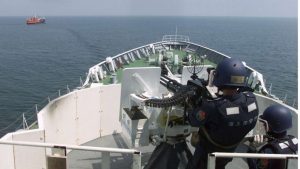 Asian pirates are focusing more of their attacks on larger merchant ships near the Philippines, hoping for bigger ransom payments from kidnapping their crew, the head of a regional anti-piracy body said on Friday.
Asian pirates are focusing more of their attacks on larger merchant ships near the Philippines, hoping for bigger ransom payments from kidnapping their crew, the head of a regional anti-piracy body said on Friday.
The region’s pirates have changed tactics since October, to target some of the biggest ships travelling through the Sulu and Celebes Seas, and paying less attention to small tugs and fishing boats.
The growing problem has prompted Indonesia, Malaysia and the Philippines to step up air and sea patrols in the waters, through which about US$40 billion worth of cargo passes each year.
“Big ships belong to bigger owners, so maybe they think bigger owners can pay more money as a ransom,” said Masafumi Kuroki, executive director of the Regional Cooperation Agreement on Combating Piracy and Armed Robbery against Ships in Asia (ReCAAP).
The group, which has 20 member states, helps co-ordinate information about maritime piracy incidents. Maritime experts recommend that vessels in the area adopt measures similar to those taken against pirates off Somalia and the Indian Ocean, including evasive action such as zigzagging, speeding up and shining powerful lights on the attackers.
Some 48 crew have been abducted in 16 attacks in the Sulu-Celebes Seas since March, of which 15 remain captive, according to ReCAAP.
In November, four large merchant vessels, including the 179,191-deadweight-tonne (DWT) capesize iron ore carrier Kumiai Shagang, were chased by armed pirates in speed boats during separate attempted attacks in the Sulu and Celebes Seas.
Abu Sayyaf militants have claimed responsibility for many of the attacks in the area. Land-based operations by the Philippine military against the group have led militants to focus more on soft targets at sea, Kuroki said.
Despite this rise in abductions, the number of overall pirate attacks in Asia dropped to its lowest level since ReCAAP was launched in 2006 to 86 incidents in 2016, down from 203 in 2015, partly due to better co-ordination by littoral states and adoption of anti-piracy measures by shippers.
Source: Reuters
